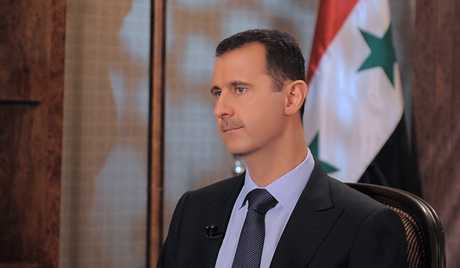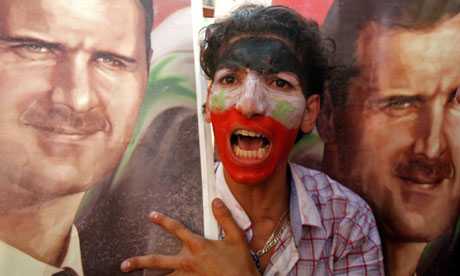 By Jay Janson
By Jay Janson
27 June, 2011
Countercurrents.org
What is unfolding in Syria is an armed insurrection supported covertly by foreign powers including the US, Turkey and Israel. Armed insurgents belonging to Islamist organizations have crossed the border from Turkey, Lebanon and Jordan. The US State Department has confirmed that it is supporting the insurgency. A monolithic unified slant media cartel restricts reports to indiscriminate killing of civilian protesters by Syrian government
Now that the West’s war on Gaddafi is going well, American news commentators can in rare moments proudly admit that the CIA is heavily involved. No so, when if comes to Syria. It’s too early. The public has not been yet been properly taught to hate Syria’s President Assad sufficiently.
The imperialist media cartel that controls what news is selected and how and with what intention it shall be broadcasted has done its best to demonize Assad. How? Simple! They just keep repeating day in day out that Syrian government forces are shooting and massacring protesters, period. They don’t say anything else. That’s it. There is nothing else happening. When it is necessary to admit that police and soldiers are being ambushed and killed, a cover story comes with it, like, ‘it is suspected that they were killed by defecting police and military.’
This amazing great cartel of Pentagon/CIA fed media conglomerates, which seems to have the great majority of the basically indifferent population of the West in tow, is effortlessly running its usual cascade of disinformation, half-truths and propaganda preparing justification for military intervention as previously in the cases of Libya, Iraq, Afghanistan, Somalia, Yemen, Pakistan and Iran.
However, “The plan to destabilize Syria is not working all that well. It succeeded in persuading public opinion that the country is in the grips of a brutal dictatorship, but it also welded the vast majority of the Syrian population firmly behind its government. Ultimately, the plan could backfire on those who masterminded it, notably Tel Aviv” surmises Thierry Meyssan in “The Plan to Destabilize Syria”, Voltaire Network, Lebanon, 6/13/11.
A few scholarly sites on the Internet always manage to fill in what is intentionally blacked out in Pentagon counseled and fed commercial mass media of the Western pseudo-democracies. Here, Michael Chossudovsky, consultant with a half-dozen UN agencies and publisher of Global Research out of Canada tell us:
“What is unfolding in Syria is an armed insurrection supported covertly by foreign powers including the US, Turkey and Israel. Armed insurgents belonging to Islamist organizations have crossed the border from Turkey, Lebanon and Jordan. The US State Department has confirmed that it is supporting the insurgency.
This was stated by U.S. State Department official Victoria Nuland. “We started to expand contacts with the Syrians, those who are calling for change, both inside and outside the country,” she said.
Action against Syria is part of a “military roadmap”, a sequencing of military operations. According to former NATO Commander General Wesley Clark–the Pentagon had clearly identified Iraq, Libya, Syria and Lebanon as target countries of a US-NATO intervention:
‘[The] Five-year campaign plan [included]… a total of seven countries, beginning with Iraq, then Syria, Lebanon, Libya, Iran, Somalia and Sudan’ (Pentagon official quoted by General Wesley Clark) In Winning Modern Wars (page 130) General Wesley Clark states the following:
‘The objective is to destabilize the Syrian State and implement “regime change” through the covert support of an armed insurgency, integrated by Islamist militia.
The reports on civilian deaths are used to provide a pretext and a justification for humanitarian intervention under the principle “Responsibility to Protect”.’
Media Disinformation
What is mentioned profusely is that the armed forces and the police are involved in the indiscriminate killing of civilian protesters. Press reports confirm, however, from the outset of the protest movement an exchange of gunfire between armed insurgents and the police, with casualties reported on both sides.
The insurrection started in mid March in the border city of Daraa, which is 10 km from the Jordanian border. The Daraa “protest movement” on March 18 had all the appearances of a staged event involving, in all likelihood, covert support to Islamic terrorists by Mossad and/or Western intelligence. Government sources point to the role of radical Salafist groups (supported by Israel)
Other reports have pointed to the role of Saudi Arabia in financing the protest movement.
What has unfolded in Daraa in the weeks following the initial violent clashes on 17-18 March, is the confrontation between the police and the armed forces on the one hand and armed units of terrorists and snipers on the other which have infiltrated the protest movement” The Destabilization of Syria and the Broader Middle East War, By Michael Chossudovsky
One would be naive to believe that the century of brutal occupation of the Arab lands of Syria, Lebanon, Algeria, Tunisia and Morocco by France and those of Iraq, Jordan, Palestine, Egypt, Sudan, Somaliland, Aden, and Yemen by the British, with both occupying Libya after W.W.II, that British M16 and and the French Secret Service would not be indispensable for the johnny-come-lately America empire and its CIA. But one would have to be even more naive to believe the excellent secret service of Israel, Mossad, at war with the Arab world since 1948 was not playing a key role in Syria and Libya, two adamant adversaries of the State of Israel. Here below is some background.
Experts Fear Israeli Design to Balkanize Arab States By Adam Morrow and Khaled Moussa al-Omrani, 6/19/11
https://www.voltairenet.org/The-plan-to-destabilize-Syria
“A Strategy for Israel in the 1980s, in 1982, ” Written by Oded Yinon, then a senior advisor for Israel’s foreign ministry, the essay explicitly calls for breaking up the Arab states of the region along ethnic and sectarian lines. The dissolution of Syria and Iraq later on into ethnically or religiously unique areas… is Israel’s primary target on the eastern front in the long run.”
“In Iraq, a division into provinces along ethnic/religious lines… is possible,” he writes. “So, three states will exist around the three major cities: Basra, Baghdad and Mosul, and Shiite areas in the south will separate from the Sunni and Kurdish north.”
As for Egypt, Yinon calls for breaking the country up into “distinct geographical regions.” The establishment of an independent Coptic-Christian state in Upper Egypt, he writes, “alongside a number of weak states with very localized power and without a centralized government…seems inevitable in the long run.”
Yinon goes on to mention Sudan in similar terms, describing it as “the most torn-apart state in the Arab-Muslim world today…built upon four groups hostile to each other: an Arab-Muslim Sunni minority which rules over a majority of non-Arab Africans, pagans and Christians.”
According to Mazloum, political maneuvering in recent years by Israel and the western powers – both overt and covert – appears to conform to this strategy of balkanization.
“Israel and the U.S. have both helped break up Iraq by encouraging the emergence of an independent Kurdish state and fostering Sunni-Shiite division,” he said. “And in Sudan, Earlier this month, Mohamed Abbas, a leading member of Egypt’s Revolutionary Coalition Council (RCC), likewise warned of an ongoing “conspiracy” aimed at breaking Egypt into three petty states.
“The Zionist plan to politically fragment the Arab Middle East so as to keep Arab states in a perpetual state of instability and weakness has been well known for the last three decades,” Gamal Mazloum, retired Egyptian major-general and expert on defense issues, told IPS.
“The western campaign against Libya … was launched with the aim of breaking Libya; Libya could be split in two, with Gaddafi staying on in the west of the country and a revolutionary government loyal to the western powers in control of the east, Mohamed al-Sakhawi, leading member of Egypt’s as-yet-unlicensed Arabic Unity Party, told IPS.”
The satellite generated media conglomerate cartel’s unified single angle presentation of world events is really difficult for progressive alternate media to dare challenge as slanted. Its deceptions become truths to everyone except the skeptical. Most progressive magazines and Internet sites and newsletters depend on keeping their less politically educated liberal readership.
What this writer suggests is that progressives at least identify Network news and conglomerate owned print media in some manner as to warn their liberal readership to be wary of giant major media’s ownership and agenda. Warn that what is being projected in between commercials is the very same agenda of our now well understood, Military Industrial Financial Complex and the three branches of government it firmly controls.
Notice how the general term media appears, even in the scholarly investigative journalism quoted in this article. Would it not carry more awareness to the reader if it was more carefully defined as ‘imperialist media.’ For what is referred to by peoples historian journalists in fighting deception and war mongering is not media per se, which must include all media, including more inclusive foreign media and U.S. alternate media containing investigative reporting in historical context without a war justifying agenda.
Someone surely can come up with something besides ‘imperialist media’ to describe the monolithic output of all the media conglomerates of an increasingly moronic U.S. media cartel with overseas linkage.
Are we never to hear of the mass homicidal crimes of the CIA until files are forced open by law decades too late? Progressives have to move on this, or lose credibility among Socialists and anti-capitalists.
Jay Janson, 80, is an archival research peoples historian activist, musician and writer, who has lived and worked on all the continents and whose articles on media have been published in China, Italy, England, India and the US, and now resides in New York City. Howard Zinn lent his name to various projects of his. GlobalReserch, InformationClearingHouse, CounterCurrents, DissidentVoice, HistoryNewsNetwork, are among those who have republished his articles.
www.countercurrents.org, 27 June 2011





